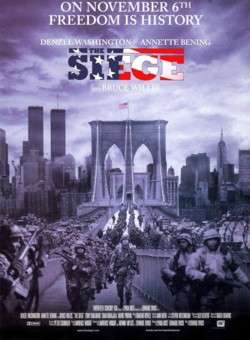The Siege (film)

Film about terrorists attacking in New York City made about three years before the September 11, 2001 attacks. The film was directed by Edward Zwick, previously known for (among others) Glory (1989) and Legends of the Fall (1994). Denzel Washington, Annette Benning, and Bruce Willis play patriotic characters with different ideas about the best way to defend America from terrorists.
The film opens with the bombing of American Army barracks in Saudi Arabia. There are multiple casualties and a terrorist cell under Sheikh Ahmed bin Talal is blamed. The action shifts to New York where a series of terrorist incidents occur, escalating in significance. Initially handled by FBI agents Anthony Hubbard (Washington) and Frank Haddad (Tony Shalhoub). Later, CIA agent Elise Kraft (Benning) gets involved. Later yet, the President declares martial law and the Army's 101st Airborne Division, under Major General William Devereaux (Willis), occupies and seals off Brooklyn in an effort to find the remaining terrorist cells. Devereaux has all young males of Arab descent, regardless of ideological affiliation, rounded up and detained in a makeshift prison camp at Yankee Stadium. This only helps worsen the situation. New Yorkers stage violent demonstrations against the army and the racial profiling of the Arabs. The Army has to fight to maintain control. There are reports of Army killings. Meanwhile, Devereaux starts interrogating suspects by torturing them. In one case to death. The situation further escalates.
In hindsight, treated terrorism more maturely than many films before 9/11. Unfortunately [1], the way the public, the government, and the terrorists acted in the film turned out to be pretty inaccurate when a large scale terrorist attacks happened in Real Life. Well, mostly.
Features cameos by a young Aasif Mandvi and Bill Clinton. Tony Shalhoub also figures, as an FBI agent of Middle Eastern origin, whose son is caught up in the profiling and internment. The film was a box office hit, its worldwide gross estimated to 116,672,912 dollars. However, only 41 million of these dollars came from the United States market. There it was the 49th most successful film of its year and received mixed reviews. At least a few critics appreciated it as "a thinking person's thriller".
- Anachronism Stew: During the scene where Deveraux is describing what the occupation of New York would entail, he distinctly mentions the "M16A1 assault rifle"; the Army had upgraded to the M16A2 years before the events of the film.
- Cassandra Truth: Ironically, the villain himself plays this, practically begging his superiors not to use him or his troops in New York City, knowing what he'd be doing to get the job done. They ignore his protests and everything goes to Hell.
- CIA Evil, FBI Good
- Deadpan Snarker Agent Frank Hadad, played by Tony Shalhoub
- Fair Cop - Agent Hub.
- General Ripper: Deveraux.
- Gunpoint Banter: The protagonist comes in with a group of fellow FBI agents to arrest the army general ... in the middle of an army camp. Cue trope.
- He Who Fights Monsters: Devereaux warns his superiors that martial law is a bad idea but when commanded to do so, he does anything and everything to eliminate the threat.
- I Am the Trope: Near the end of the film:
William Devereaux: I am the law. Right here, right now, I am the law!
- Invisible President - Strangely subverted. Newsreel footage of Clinton appears at the beginning of the film, and his portrait hangs in in Denzel Washington's office. But the characters refer to him as if he were a President Invisible. Bruce Willis does manage to get off a joke about the president being good at protecting himself, though.
- Knight Templar: Devereaux
- Life Imitates Art: Three years after the movie came out, the U.S. suffered its worst terrorist attack in its history, with many parallels to the film.
- Post 9-11 Terrorism Movie - Subverted, or rather an amazingly literal example of an Unbuilt Trope.
- Prison Rape:
Hubbard: You know what they do to new girls at Ryker's Island?
Kraft: Mmmmm...Yum.
- Profiling, and how!
- Really Gets Around: Elise, but that is part of her professional duties.
- Recruiting the Criminal: Elise takes this approach, though it doesn't work out.
- Running Gag: Frank lamenting about the FBI not having microwave surveillance equipment.
- Smoking Hot Sex: Samir Nazhde takes a smoke after having sex with Sharon Bridger in one scene.
- Xanatos Gambit: The movie ends with a big one when Denzel Washington's Agent Hub leads a team of FBI agents (basically everyone who's left alive) to arrest General Deveraux in the middle of his Army camp. He and his agents are completely outnumbered and outgunned but that doesn't matter because either Deveraux will stand down, he'll order his men to fire and they'll refuse to kill the FBI agents (who are supposed to be on the same side), or he'll order them to fire, they'll follow the order, and the murder of a dozen federal agents will be too much lawlessness for the White House to tolerate, and Deveraux will be relieved of command. Anyway it goes down, Hub (and the rule of law) win. Deveraux sees the play too, which is why he he engages in Gunpoint Banter with Hub instead of just ordering his soldiers to fire, but finally he decides since he's going to lose any way he plays it, he'll stand down and avoid throwing good money after bad with another illegal order.